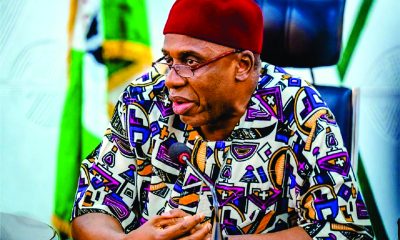Business
FG Urges Smooth Implementation Of Mobile Number Portability
The Minister of Communications Technology, Mrs Omobola Johnson, has urged telecommunications service providers to ensure smooth implementation of Mobile Number Portability (MNP) in Nigeria.
Johnson made the plea recently in Abuja at the opening of the international forum on Mobile Number Portability (MNP) implementation and management.
The minister was represented by the Deputy Director, Telecom and Postal, in the ministry, Alhaji Ahmed Gumel, at the forum, organised by BSP Media Group in conjunction with Nigerian Communications Commission (NCC).
She said that the introduction of MNP in the Nigerian market was a welcome development and urged the organisers of the forum to adequately educate stakeholders on the requirements for the implementation and their roles.
Johnson said that the benefits and code of practice should be clearly defined to enshrine confidence in the telecoms sector.
“The Nigeria public has been coping with unsatisfactory services by operators which have resulted in consumers maintaining multiple phone numbers and telephone handsets.
“This has caused such individuals to expend funds that could be better used to address other needs.
“I have no doubt that once the MNP comes on board, it will foster competition and improve on quality of service since subscribers will have the power of choosing their network without losing their numbers which they were originally known with ,’’Johnson said.
The Executive Vice-Chairman of NCC, Dr Eugene Juwah, said the commission had seen MNP as a tool that could foster competition, improve quality of service, stimulate innovation and increase the speed of telecommunications in Nigeria.
Juwah saidthat MNPwould encourage service providers to improve their quality of service and strive to retain their subscribers and attract new ones.
“The commission believes that as competition increases with MNP, quality of service will also increase, resulting in a reduction in tariffs for telecommunications services.
“This will be good for the industry and will also make telecommunications services more affordable generally. The days of retaining customers based on network coverage alone will soon be a thing of the past,’’ Juwah said.
He said the commission in February licensed Interconnects Clearinghouse Nigeria Ltd and its technical partners, Telcordia Inc and Saab Grintek, to set up, establish, operate and manage the MNP administration service in Nigeria.
Business
Group Pledges Stronger Partnerships For Food Security

The River Basin Development Authorities (RBDAs) in Nigeria have pledged to boost the Federal Government’s food security efforts by forming stronger partnerships and adopting modern agricultural technologies.
The representative of RBDAs, Alhaji Abubakar Malam, who spoke on behalf of the boards and management teams at the close of a two-day retreat in Abuja, recently, acknowledged the numerous challenges facing the authorities.
He noted the persistent issues of ageing infrastructure, extreme weather conditions, and insecurity that continue to hinder optimal productivity across their zones.
Malam, who is also the Managing Director of the Sokoto Rima River Basin Development Authority, noted the dilapidated state of facilities and outdated equipment that limit the full potential of the river basin authorities.
“Our facilities are obsolete, and climate change is exacerbating the situation with flooding, erosion, and erratic weather patterns.
“Yet, we remain undeterred. We are committed to innovating, adopting modern irrigation technologies, and shifting the narrative of the River Basins to a more sustainable and productive future”, he said.
Malam emphasised that these objectives cannot be achieved in isolation and stressed the importance of collaboration.
He noted, “We are committed to building strong partnerships, particularly with state governments, to ensure that local actions are aligned with national priorities.
“Collaboration is key to enhancing extension services, addressing community needs, and improving project outcomes”.
The Managing Director also assured stakeholders that the river basin authorities will continue to maintain open-door policies under the federal government’s partial commercialisation framework, which aims to encourage private sector investment.
“This framework is seen as an essential step in reviving Nigeria’s agricultural sector by providing opportunities for agribusiness development, rural economy revitalisation, and sustainable irrigation practices.
“In alignment with President Bola Tinubu’s Renewed Hope Agenda and the UN Sustainable Development Goals (SDGs), particularly Goals 2 (Zero Hunger), 6 (Clean Water and Sanitation), and 13 (Climate Action), the RBDAs are focusing on expanding irrigated farmlands, equipping farmers with modern agricultural techniques.
“Others are enhancing value chains to reduce food waste, boost production, and improve market access.
“These efforts are designed to increase food availability and contribute to the goal of achieving food security for the nation by 2027”, he stated.
The Joint Appointees Forum further called on development partners, private sector players, and other stakeholders to seize the emerging opportunities in Nigeria’s agriculture sector.
The forum highlighted the potential for collaboration in revitalising rural economies through sustainable irrigation and agribusiness development, which will ultimately support the government’s food security agenda.
Business
SEC Cautions Nigerians Against Ponzi Schemes

The Securities and Ex-change Commission (SEC) has cautioned Nigerians on the dangers of Ponzi schemes, highlighting their devastating impact on investor confidence, financial stability, and the Nigerian capital market, specifically.
SEC in a release through the Head of its Enforcement Department, Dr. Sa’ad Abdulsalam, after an Enlightenment Programme on Capital Market, noted that the pitfalls and illegality of Ponzi Schemes ought to be avoided.
Abdulsalam stated that the proliferation of fraudulent investment schemes continue to erode public trust in formal investment platforms by offering unrealistic returns and operating outside the regulatory framework, destabilized investor sentiment and undermined participation in legitimate capital market activities.
“The erosion of market confidence caused by Ponzi schemes leads to significant volatility and reduced investor engagement.
”The fallout not only damages individual finances, but also tarnishes the reputation of regulatory institutions tasked with protecting investor interests”, he noted.
Beyond the capital market, Abdulsalam emphasized that the social and economic consequences of Ponzi schemes are far-reaching, noting that household financial losses, often involving life savings or borrowed funds, intensify socio-economic stress and threaten community cohesion.
“These losses are not just figures on a balance sheet. They represent broken trust, devastated livelihoods, and increased poverty in affected communities.
“Nigeria has a long and troubling history with Ponzi operations”, he explained.
He further noted that from the infamous Umanah Umanah scheme in the 1990s to Nospecto in the early 2000s and the widespread MMM craze of the 2010s, fraudulent fund managers have repeatedly exploited regulatory gaps and economic vulnerabilities.
According to him, over 400 unlicensed fund managers were uncovered in 2010 alone, underscoring the scale of the threat.
He attributed the rise of Ponzi schemes to several factors, including limited financial literacy, the lure of quick returns during periods of economic hardship, and the rapid spread of misinformation through social media.
Abdulsalam, however, noted that the proliferation of fraudulent investment schemes continues to erode public trust in formal investment platforms by offering unrealistic returns and operating outside the regulatory framework, destabilized investor sentiment and undermined participation in legitimate capital market activities.
By: Corlins Walter
Business
CBN Identifies Money Supply Increase From N114trn To N119trn In April

The Central Bank of Nigeria (CBN) has said money supply (M2) increased by 4.2 percent, month-on-month (MoM), from N114.2 trillion in March, to N119.1 trillion in April 2025.
According to the apex bank’s Money and Credit Statistics data for April 2025, the increase in money supply followed positive changes in its components, with Quasi-money, including savings deposits, time deposits, and other near-money assets, rising significantly.
The data showed that Quasi Money grew by 3.17 percent MoM to N78.1 trillion in April from N75.7 trillion in March.
Similarly, Demand Deposits increased by 7.4 percent MoM to N36.4 trillion in April from N33.9 trillion it was in March.
The CBN data report also showed that Narrow money (M1) also grew by 6.2 percent MoM to N41 trillion in April from N38.6 trillion it was in March.
Nevertheless, currency outside banks increased slightly by 0.4 percent MoM to N4.57 trillion in April from N4.59 trillion in March.
Also, the data showed that credit to the government fell by 8.8 percent MoM to N23.6 trillion in April from N25.9 trillion in March, representing the second consecutive month’s decline since March.
On the other hand, credit to the private sector grew by 2.1 percent MoM to N77.9 trillion in April from N76.3 trillion in March.
According to the data report, this resulted in a 0.61 percent MoM decline in net domestic credit to N101.5 trillion in April from the N102.13 trillion it was in the month of March.
By: Corlins Walter
-
Business3 days ago
‘Agriculture, Vital Part Of Rivers Economy’
-

 Niger Delta2 days ago
Niger Delta2 days agoOborevwori Promises Enhanced Transformational Leadership In Delta
-

 News2 days ago
News2 days agoRivers @ 58: Return To Path Of Peace, Forgiveness, Ibas Tells Rivers Stakeholders
-

 Politics3 days ago
Politics3 days agoEx-Dep Speaker Hails Tinubu, Wike Over FCT Dev
-

 City Crime2 days ago
City Crime2 days agoInfrastructural Decay Hinders Conduct Of 2025 JAMB, WASCE Exams – Obi
-

 Politics3 days ago
Politics3 days agoWhy I Didn’t Support APC, Vote Tinubu In 2023 – Amaechi
-

 Niger Delta2 days ago
Niger Delta2 days agoPolice Neutralise Three Kidnap Suspects In Delta
-

 News2 days ago
News2 days agoTinubu’s Intervention Saved Rivers From Anarchy -Fubara

